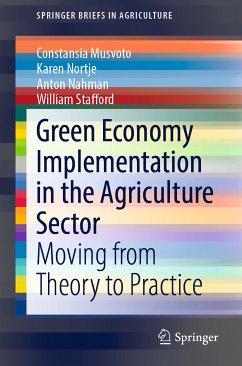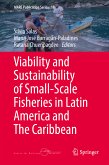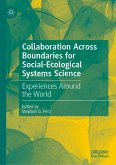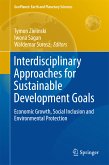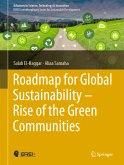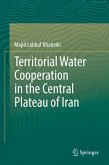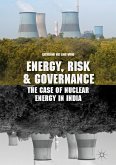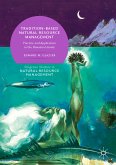Green Economy Implementation in the Agriculture Sector (eBook, PDF)
Moving from Theory to Practice


Alle Infos zum eBook verschenken

Green Economy Implementation in the Agriculture Sector (eBook, PDF)
Moving from Theory to Practice
- Format: PDF
- Merkliste
- Auf die Merkliste
- Bewerten Bewerten
- Teilen
- Produkt teilen
- Produkterinnerung
- Produkterinnerung

Hier können Sie sich einloggen

Bitte loggen Sie sich zunächst in Ihr Kundenkonto ein oder registrieren Sie sich bei bücher.de, um das eBook-Abo tolino select nutzen zu können.
This book, focusing on the agriculture sector, provides useful analysis of the green economy implementation context and a practical framework for implementing vegetable crop production green economy projects. The book addresses a distinct gap, as there are currently no guidelines available for planning and implementing green economy projects in the agriculture sector. The book combines information from desktop reviews and field research on vegetable production in a green economy context in South Africa in order to bridge the gap between the theoretical green economy concept and practical…mehr
- Geräte: PC
- ohne Kopierschutz
- eBook Hilfe
- Größe: 2.19MB
![Viability and Sustainability of Small-Scale Fisheries in Latin America and The Caribbean (eBook, PDF) Viability and Sustainability of Small-Scale Fisheries in Latin America and The Caribbean (eBook, PDF)]() Viability and Sustainability of Small-Scale Fisheries in Latin America and The Caribbean (eBook, PDF)97,95 €
Viability and Sustainability of Small-Scale Fisheries in Latin America and The Caribbean (eBook, PDF)97,95 €![Collaboration Across Boundaries for Social-Ecological Systems Science (eBook, PDF) Collaboration Across Boundaries for Social-Ecological Systems Science (eBook, PDF)]() Collaboration Across Boundaries for Social-Ecological Systems Science (eBook, PDF)89,95 €
Collaboration Across Boundaries for Social-Ecological Systems Science (eBook, PDF)89,95 €![Interdisciplinary Approaches for Sustainable Development Goals (eBook, PDF) Interdisciplinary Approaches for Sustainable Development Goals (eBook, PDF)]() Interdisciplinary Approaches for Sustainable Development Goals (eBook, PDF)69,95 €
Interdisciplinary Approaches for Sustainable Development Goals (eBook, PDF)69,95 €![Roadmap for Global Sustainability - Rise of the Green Communities (eBook, PDF) Roadmap for Global Sustainability - Rise of the Green Communities (eBook, PDF)]() Salah El-HaggarRoadmap for Global Sustainability - Rise of the Green Communities (eBook, PDF)73,95 €
Salah El-HaggarRoadmap for Global Sustainability - Rise of the Green Communities (eBook, PDF)73,95 €![Territorial Water Cooperation in the Central Plateau of Iran (eBook, PDF) Territorial Water Cooperation in the Central Plateau of Iran (eBook, PDF)]() Majid Labbaf KhaneikiTerritorial Water Cooperation in the Central Plateau of Iran (eBook, PDF)40,95 €
Majid Labbaf KhaneikiTerritorial Water Cooperation in the Central Plateau of Iran (eBook, PDF)40,95 €![Energy, Risk and Governance (eBook, PDF) Energy, Risk and Governance (eBook, PDF)]() Catherine Mei Ling WongEnergy, Risk and Governance (eBook, PDF)81,95 €
Catherine Mei Ling WongEnergy, Risk and Governance (eBook, PDF)81,95 €![Tradition-Based Natural Resource Management (eBook, PDF) Tradition-Based Natural Resource Management (eBook, PDF)]() Edward W. GlazierTradition-Based Natural Resource Management (eBook, PDF)61,95 €
Edward W. GlazierTradition-Based Natural Resource Management (eBook, PDF)61,95 €-
-
-
Dieser Download kann aus rechtlichen Gründen nur mit Rechnungsadresse in A, B, BG, CY, CZ, D, DK, EW, E, FIN, F, GR, HR, H, IRL, I, LT, L, LR, M, NL, PL, P, R, S, SLO, SK ausgeliefert werden.
- Produktdetails
- Verlag: Springer International Publishing
- Seitenzahl: 127
- Erscheinungstermin: 1. Januar 2019
- Englisch
- ISBN-13: 9783030018092
- Artikelnr.: 54856359
- Verlag: Springer International Publishing
- Seitenzahl: 127
- Erscheinungstermin: 1. Januar 2019
- Englisch
- ISBN-13: 9783030018092
- Artikelnr.: 54856359
- Herstellerkennzeichnung Die Herstellerinformationen sind derzeit nicht verfügbar.
Karen Nortje is a Senior Researcher and Environmental Anthropologist at the CSIR's Natural Resources and the Environment Unit. She holds a Masters degree in Social Anthropology from the University of the Witwatersrand and is currently in a PhD programme with the University of Johannesburg. Her key competencies lie in researching and understanding socio/cultural issues which often means that her research is directed at the local and individual level of society. Her expertise therefore includes understanding community organisation, working with communities, and determining social and cultural impacts. Karen also has extensive knowledge on indigenous knowledge systems and their impact on water resources and related environmental goods and services. She has done extensive fieldwork throughout South Africa as well as internationally (e.g. Costa Rica, India, Mozambique, Vietnam). She does research on the role of public belief systems in perception on bio-physical (including climate change), socio-economic and cultural-spiritual vulnerabilities in rural communities, social ecology and conservation, as well as the uptake of scientific research. Karen has been working at the CSIR for about nine years and has more than twelve years of experience in research specialising in qualitative research methodology and method.
Anton Nahman holds an MSc in Environment and Development from the University of Manchester, United Kingdom. He has over 10 years of experience in environmental economics research, applied to a diverse range of areas. These include economic valuation of environmental resources and impacts; cost-benefit analysis; the economics of pollution and waste management; economic incentive-based policy tools for developing a green economy in the agricultural, water and waste sectors; the development of decision-support tools and models; and the development of alternative indicators of well-being. For example, Anton has conducted cost-benefit analyses comparing, among others, alternative treatment measures for acid-mind drainage. He has also assessed the economic benefits of biodiversity and of eco-labels such as Blue Flag status, the economic impacts of poor water quality, and the full costs (including financial costs and environmental/social externalities) of food waste and of disposal of waste to landfill. He has evaluated market-based approaches to water-demand management, waste management, and recycling. Finally, he has developed a Green Economy Index for measuring progress toward a green economy, and a decision support tool for assessing the costs and benefits of alternative approaches to collection of household recyclables.
William Stafford is a life scientist with research and development experience spanning twenty years. His research encompasses diverse fields of biochemistry, biotechnology, microbial ecology, systems biology, holistic resource management, industrial ecology, renewable energy and permaculture. As a senior researcher at the Council for Scientific and Industrial Research (CSIR), an overarching research question is: How can our natural resources be used sustainably for the benefit of all? Current research involves assessing various technology options, value-chains and alternate development scenarios to guide project and policy developments for the transition to a Green Economy and a more sustainable development path. Bioenergy is currently a research focus area that addresses a multiple development objectives; such as economic feasibility, social acceptance, environmental impacts and the allocation of biomass resources for the production of food, fuel, timber, chemicals and fibres in the growing Bio-economy.
